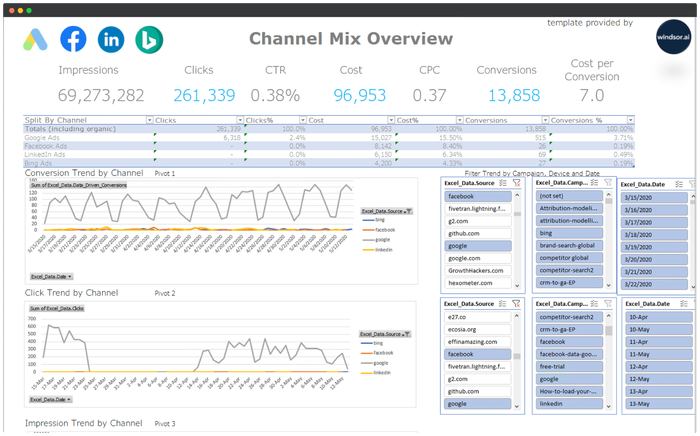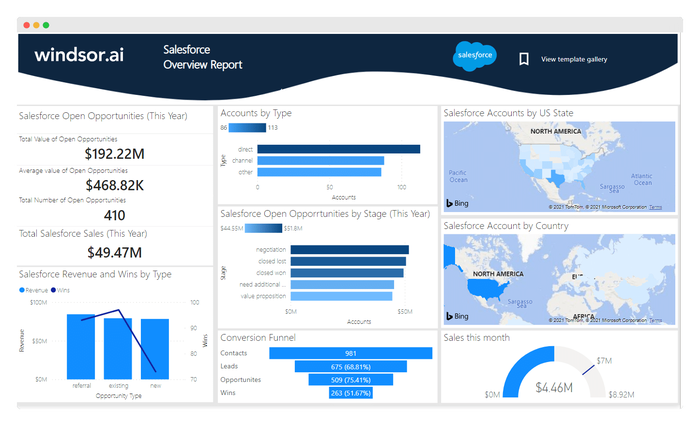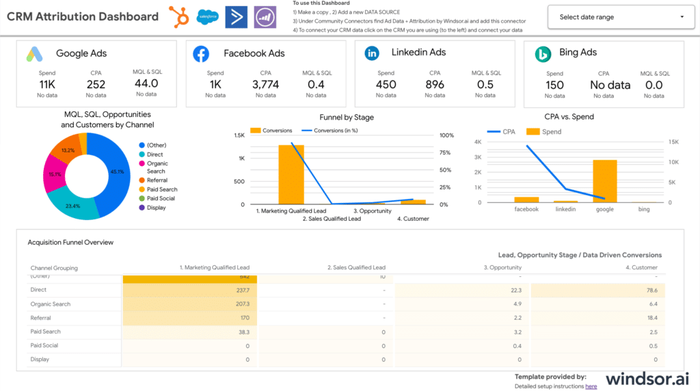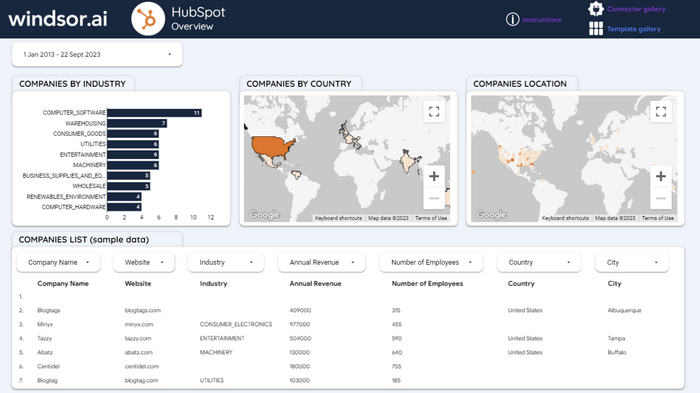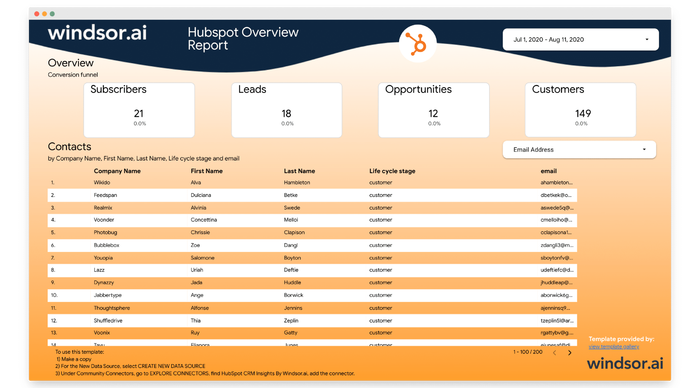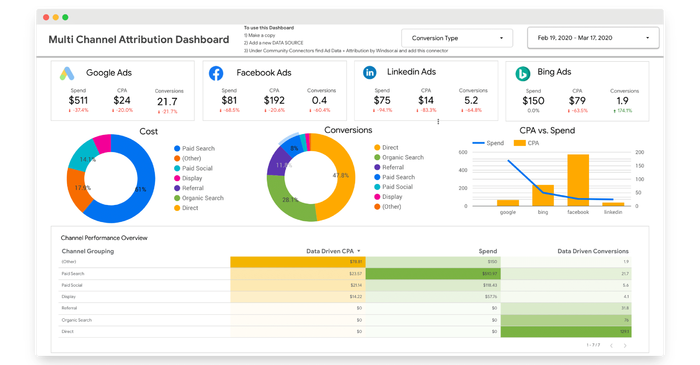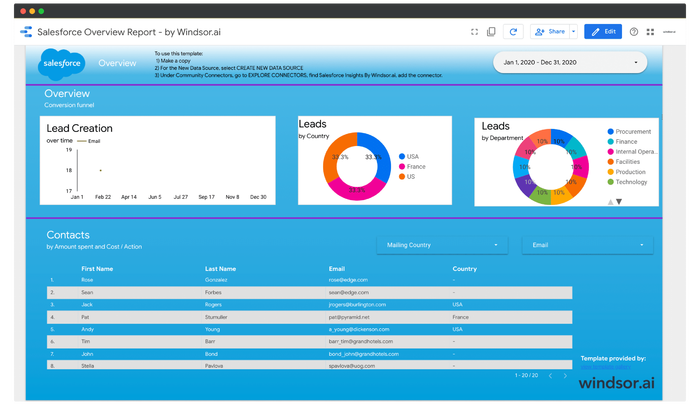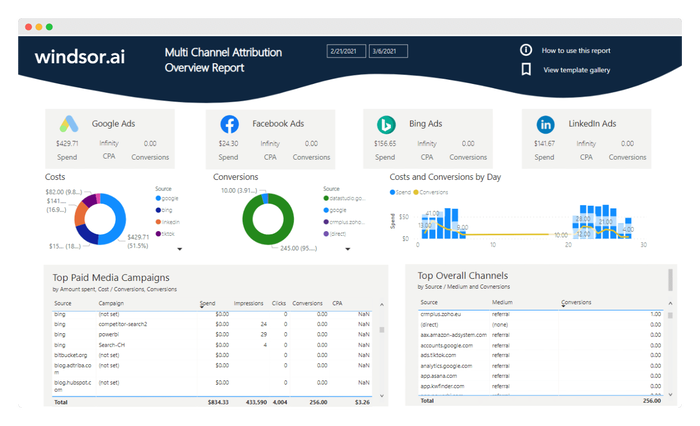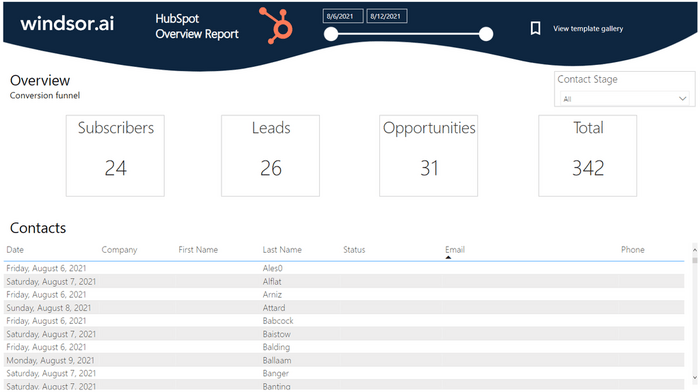Free CRM Dashboard Templates
At Windsor.ai, we strive to make CRM marketing reporting as effortless as possible for our users
These CRM report templates will help you optimize your marketing spending and investments
Free CRM Dashboard Templates with easy-to-follow instructions for connecting your own data
Find the right template from CRM’s library and start using them to save time, effort and increase productivity
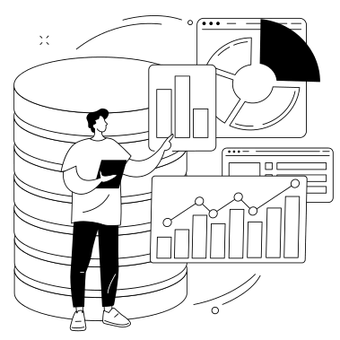
Try Windsor.ai today
Access all your data from your favorite sources in one place.
Get started for free with a 30 - day trial.
What is a CRM Dashboard?
A CRM dashboard provides a visual interface for tracking, analyzing, and overseeing sales activities, key performance indicators, goals, leads, and their respective stages. Additionally, it offers a quick overview of the performance of individual sales team members.
Harnessing the insightful data offered by a CRM dashboard enables you to enhance your decision-making process, assess the overall health of your business, and refine marketing campaigns and sales strategies as required. The visual representation facilitates a comprehensive understanding of your sales landscape.
What should you include in a CRM dashboard?
To cater to various teams, particularly sales and marketing, a CRM dashboard should encompass the following:
Key Metrics
Include crucial metrics tailored to the team utilizing the CRM. Metrics like Leads, Customer Satisfaction, Churn Rate, Customer Lifetime Value, Win Rate, and Total Sales provide valuable insights.
Sales Funnel
Incorporate a sales funnel to visualize the distribution of prospects at each stage, from awareness to renewal. This aids in identifying areas of lead and customer attrition, offering a clear overview of the conversion process.
New Leads and Deals
Displaying new leads and deals provides a list of opportunities, offering insight into the upcoming workload for sales teams and facilitating proactive management.
Open/Closed Deals
Highlight the ratio between open and closed deals, allowing sales representatives to efficiently manage their workload. Additionally, include the value of closed or won deals for a comprehensive overview.
Goals
Integrate goals or milestones into the CRM report to establish a clear direction for your business and track progress.
Sales Rep Performance
Showcase the performance of individual sales representatives, enabling managers to identify and reward high-performing team members. It also helps pinpoint underperforming sales reps, providing an opportunity for support or training.
Reasons for Lost Deals
Incorporate a crucial element by including reasons for lost deals. Feedback from lost leads about why they didn’t choose your product or service can guide product upgrades and improvements.
Branding Assets
If sharing performance with stakeholders, include branding assets such as a logo for a clear and professional presentation of the dashboard overview.
How to create a CRM dashboard in 2024
There are several options for creating a dashboard or report for your CRM data:
Build a CRM Dashboard from Scratch
- Opt for data visualization tools like Looker Studio or Tableau to construct a dashboard tailored to your needs.
- Begin from scratch, incorporating all desired metrics. Be mindful, though, as this method can be time-consuming, and there’s a risk of overlooking essential KPIs.
- Explore tutorials, such as the one guiding the creation of a Looker Studio dashboard from zero.
Utilize a Template
- Take advantage of templates offered by data visualization tools or third-party vendors like Windsor.io.
- Templates, readily available, can be easily personalized. They save time compared to starting from scratch and often come pre-equipped with key elements such as essential metrics and sales pipelines.
Engage an Expert
- If time constraints or customization complexity are factors, consider enlisting an expert to craft the CRM dashboard.
- Experts can ensure the dashboard aligns with your specific requirements and includes all necessary components.
5 Best CRM Dashboard Templates
- Power BI HubSpot Overview Dashboard Template
- Looker Studio CRM Attribution Dashboard Template
- Looker Studio HubSpot Dashboard Template
- Power BI Salesforce Dashboard Template
- Looker Studio Salesforce Overview Report
Who uses CRM dashboards?
Various professionals and teams leverage Customer Relationship Management (CRM) dashboards, including:
Sales Teams
- Use CRM dashboards to monitor leads and sales performance
- Track sales pipelines, set goals, and analyze progress
Marketing Teams
- Employ dashboards to segment customer data
- Track campaign performance and assess the effectiveness of different campaigns
Customer Support or Service Teams
- Rely on CRM dashboards to view customer histories and track service requests
- Manage customer inquiries efficiently
Business Analysts
- Use CRM dashboards for report generation, data analysis, and trend identification
- Assist in decision-making and strategy development
Management and Executives
- Utilize dashboards for an overview of overall business performance
- Keep an eye on important Key Performance Indicators
